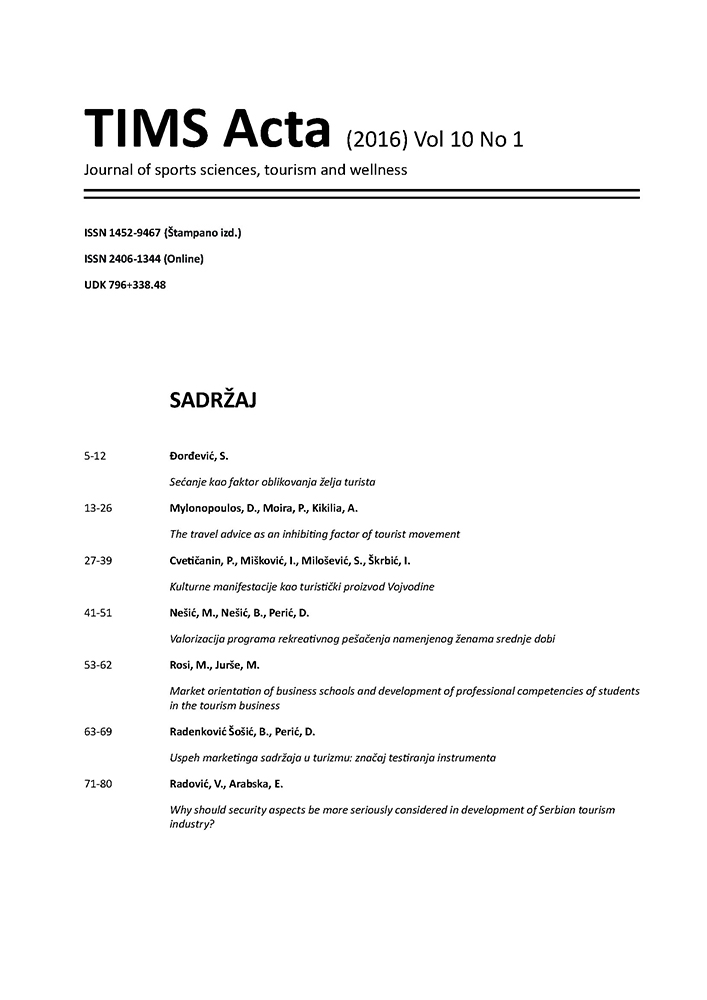THE TRAVEL ADVICE AS AN INHIBITING FACTOR OF TOURIST MOVEMENT
Abstract
Tourism is significantly affected by unpredictable and uncertain factors such as the occurrence of a terrorist attack, an epidemic outbreak or a natural disaster, etc. The impact of these phenomena on the tourist movement of the country or the place where the event occurred is aggravated by the way it is presented by the media both locally and internationally. The adverse climate gets worse by the issuance of travel advices which usually accompany such phenomena and have the effect of limiting or even halting tourist flows.
In order to identify and study the different types of travel advices which have been issued during international tourism crisis incidents, an internet search was carried out using keywords. Moreover, a study on the travel advices issued by major tourists’ origin states, as the USA, Australia, Canada, Germany, the United Kingdom etc. was performed. Incidents (terrorist attacks, epidemics, natural disasters) which had a great impact on tourism were then selected. In addition, the issuance of travel advices, their different issuing authorities, the classification level and the impact on the tourism of the country or the place in question were examined. An analysis of the reaction and the instructions of major international organizations (World Health Organization, World Tourism Organization) concerning the management of such crises, directly or indirectly affecting tourism, were also analyzed.
The study of the relevant websites, the international literature and the recorded incidents shows that the issuing of a travel advice has negative effects on many sectors of tourism activity and is a bottleneck for tourism development. In fact, in many cases, the travel advice is used by countries to exert pressure on other countries in order to achieve a desired result. Due to the enormous economic and social effects when issuing a travel advice, the states proper management is necessary in order to minimize the negative consequences and avoid obstructing the free movement of tourists, as provided for in international treaties and declarations.
As no systematic research on the impact of travel advices to a country and the degree of influence depending on the issuing entity (state, international organization or private entity) has been carried out so far, further investigation of the issue is suggested, by performing research, both on travelers and travel organizations on the effects of issuing a travel advice.- Autori zadržavaju autorska prava i pružaju časopisu pravo prvog objavljivanja rada i licenciraju ga "Creative Commons Attribution licencom" koja omogućava drugima da dele rad, uz uslov navođenja autorstva i izvornog objavljivanja u ovom časopisu.
- Autori mogu izraditi zasebne, ugovorne aranžmane za neekskluzivnu distribuciju članka objavljenog u časopisu (npr. postavljanje u institucionalni repozitorijum ili objavljivanje u knjizi), uz navođenje da je članak izvorno objavljen u ovom časopisu.
- Autorima je dozvoljeno i podstiču se da postave objavljeni članak onlajn (npr. u institucionalni repozitorijum ili na svoju internet stranicu) pre ili tokom postupka prijave rukopisa, s obzirom da takav postupak može voditi produktivnoj razmeni ideja i ranijoj i većoj citiranosti objavljenog članka (Vidi Efekti otvorenog pristupa).

